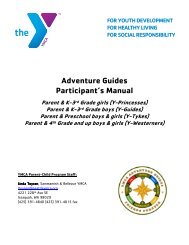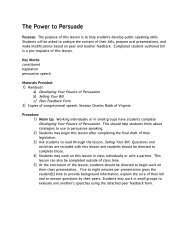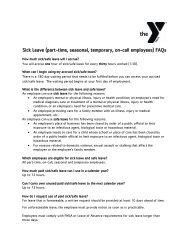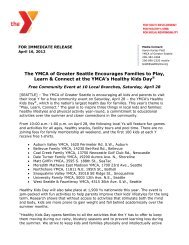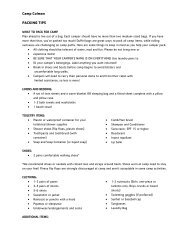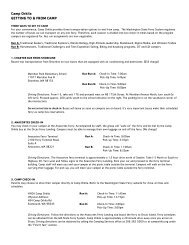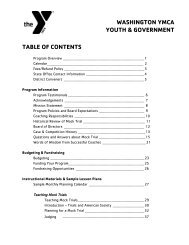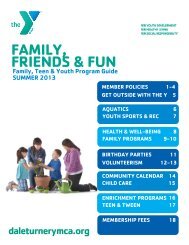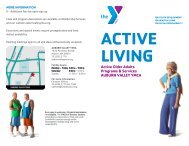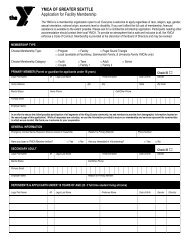washington mock trial rules of evidence - YMCA of Greater Seattle
washington mock trial rules of evidence - YMCA of Greater Seattle
washington mock trial rules of evidence - YMCA of Greater Seattle
You also want an ePaper? Increase the reach of your titles
YUMPU automatically turns print PDFs into web optimized ePapers that Google loves.
Rule 608(b) is designed to avoid mini-<strong>trial</strong>s on specific instances <strong>of</strong> a witness’struthfulness or untruthfulness. Thus, the details <strong>of</strong> a prior dispute between Ms. X and Ms.Y, in which Ms. X allegedly lied, are inadmissible “extrinsic” <strong>evidence</strong>. Similarly, if Mr. Qwitnessed the accident, testified for plaintiff, and falsely claimed he was walking homefrom church at the time, defendant could not call the card dealer at the casino to testifythat Mr. Q had actually been at the casino, not at church. Such attacks on the credibility <strong>of</strong>nonparty witnesses are <strong>of</strong> marginal relevance and consume too much time. Note, however,that on cross-examination <strong>of</strong> Mr. Q, the defense attorney could ask, “Isn’t it true that youwere walking home from the casino?”Rule 609. IMPEACHMENT BY EVIDENCE OF CONVICTION OF CRIME; TIME LIMITS(a) For the purpose <strong>of</strong> attacking the credibility <strong>of</strong> a witness in a criminal or civil case,<strong>evidence</strong> that the witness had been convicted <strong>of</strong> a crime shall be admitted if elicited fromthe witness or established by public record during examination <strong>of</strong> the witness but only ifthe crime (1) was punishable by death or imprisonment in excess <strong>of</strong> one year under the lawunder which the witness was convicted, and the court determines that the probative value<strong>of</strong> admitting the <strong>evidence</strong> outweighs the prejudice to the party against whom the <strong>evidence</strong>is <strong>of</strong>fered, or (2) involved dishonesty or false statement, regardless <strong>of</strong> the punishment.(b) Evidence <strong>of</strong> a conviction under this rule is not admissible if a period <strong>of</strong> more than 10years has elapsed since the date <strong>of</strong> the conviction or <strong>of</strong> the release <strong>of</strong> the witness from theconfinement imposed for that conviction, whichever is the later date, unless the courtdetermines, in the interests <strong>of</strong> justice, that the probative value <strong>of</strong> the conviction supportedby specific facts and circumstances substantially outweighs its prejudicial effect. However,<strong>evidence</strong> <strong>of</strong> a conviction more than 10 years old as calculated herein, is not admissibleunless the proponent gives to the adverse party sufficient advance written notice <strong>of</strong> intentto use such <strong>evidence</strong> to provide the adverse party with a fair opportunity to contest theuse <strong>of</strong> such <strong>evidence</strong>.(c) Effect <strong>of</strong> pardon, annulment, or certificate <strong>of</strong> rehabilitation -- Evidence <strong>of</strong> a convictionis not admissible if (1) the conviction has been the subject <strong>of</strong> a pardon or other equivalentprocedure based on a finding <strong>of</strong> the rehabilitation <strong>of</strong> the person convicted <strong>of</strong> a subsequentcrime which was punishable by death or imprisonment in excess <strong>of</strong> one year, or (2) theconviction has been the subject <strong>of</strong> a pardon, other equivalent procedure based on a finding<strong>of</strong> innocence.(d) Juvenile adjudications -- Evidence <strong>of</strong> juvenile adjudications is generally not admissibleunder this rule. The court may, however, in a criminal case allow <strong>evidence</strong> <strong>of</strong> a juvenileadjudication <strong>of</strong> a witness other than the accused if conviction <strong>of</strong> the <strong>of</strong>fense would beadmissible to attack the credibility <strong>of</strong> an adult and the court is satisfied that admission in<strong>evidence</strong> is necessary for a fair determination <strong>of</strong> the issue <strong>of</strong> guilt or innocence.



